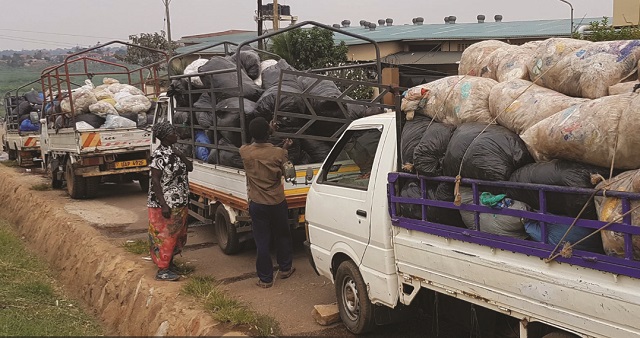
Will 80% supply hole in Uganda’s polythene bag market be crisis or opportunity?
Kampala, Uganda | RONALD MUSOKE | Ugandan environmentalists are renewing their fight against the manufacture of polythene materials in the country following the Aug. 28 enforcement of a ban on plastic carrier bags by the Kenyan government.
“We hope Kenya’s banning of the manufacture of plastic bags will reduce the quantity of smuggled plastic bags into the country,” said Charles Ogang, the President of the Uganda National Farmers Federation.
“The ban on polythene bags in Uganda has tended to be on and off mainly because of weak implementing institutions in the region,” said Frank Muramuzi, the executive director of the National Association of Professional Environmentalists (NAPE); a Kampala based non-profit. Muramuzi expects the Kenyan ban to have a positive impact in Uganda in the long run.
The ban means that any Kenyan found manufacturing, selling, or carrying single-use plastic bags popularly known as ‘kaveera’ in Uganda faces a fine of up to $38,000 (Shs 137 million) or a prison sentence of up to four years. Industrial production of plastic-wrapped goods and plastic bin liners are not affected by the ban. It is the Plastic carrier bags and flat bags used for commercial and household packaging that are banned.
The ban was first announced in February but it was suspended for six months to allow Kenyan consumers and shopkeepers to adjust to the new rules. The Kenya Manufacturers Association (KAM), led by two polythene bags importers, had tried to halt the ban by going to the High Court arguing that over 60,000 Kenyans stood to lose their jobs and close to 170 companies would wind up.
However, the court rejected their arguments and, on Aug.25, ruled that “environmental concerns are more important than commercial interests.”
The UN Environment Programme (UNEP) says Kenyan supermarkets give out over 100 million plastic bags every year to shoppers. Erik Solheim, the UNEP executive director welcomed the ban calling it “a huge, important step” to ending plastic pollution.
People have been advised to instead use paper bags, clothing bags, canvas bags, sisal bags and papyrus bags.
The late August announcement makes Kenya the latest African country to ban the use of polythene plastic bags. But with the exception of Rwanda which has implemented the ban for the last ten years, enforcement of similar bans in Uganda, Ethiopia, Guinea Bissau, Mali, Malawi, Mauritania, Eritrea and Cameroon has been weak.
The polythene material manufacturers lobby in Uganda, for example,is fighting the ban aggressively.
Alfred Rwabugahya, the Business Coordinator of the Uganda Plastics Manufacturers and Recyclers Association (UPMRA), told The Independent on Sept.02 that the Kenyan ban does not affect Uganda.
“Even if Kenya bans polythene bags, it does not necessarily mean that the whole world has banned and it is not only East Africa which uses plastic bags.”
In the past, UMPRA which brings together over 25 small industries and claims to have invested in a multi-billion complex of industries in Uganda has said it is wrong for local manufacturing to be targeted when about 80% of polythene bags used in Uganda come from Kenya.
Rwabugahya says Ugandan companies will continue producing polythene bags because the government has not ordered them to stop. And, he warned, ordering a ban on manufacturing the bags will kill at least 20 factories which are still producing the legally accepted gauge of polythene bags of above 30 microns.
Since both the environmentalists’ and manufacturers’ positions are not new, all anticipation is on the actions, if any, that the Uganda government will take following the Kenyan ban. President Yoweri Museveni’s position will be very critical.
Paul Mafabi, the director Environmental Affairs at the Ministry of Water and Environment told The Independent that for the Kenyan ban to impact on the implementation of a similar ban in Uganda, “the politicization of the ban needs to be sorted out.”
Uganda first banned the use of polythene bags below 30 microns in 2007/8 but enforcement of the ban was frustrated by the powerful manufacturers lobby. In April, 2015, officials of the National Environmental Management Agency (NEMA) backed by Police and the Uganda Revenue Authority attempted to implement the ban by raiding supermarkets impounding thousands of pieces of polythene bags, but the operations fizzled out.
 The Independent Uganda: You get the Truth we Pay the Price
The Independent Uganda: You get the Truth we Pay the Price




In 2015, then Gambia’s strongman Yahya Jammeh gave Gambians one month to stop using plastic carrier bags and they complied without a hitch. I hope the ban is still in place after Jammeh’s departure.